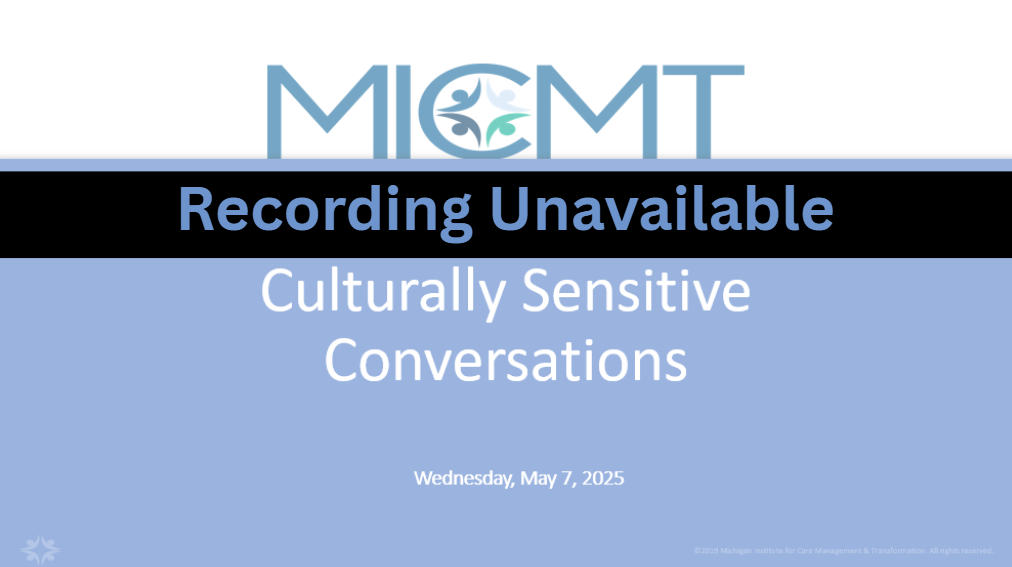2025 MICMT Team-Based Care Conference
Welcome (12:00 p.m. – 12:10 p.m.)
Julie Wietzke, MHSA, MLS
Administrative Director
MICMT
Applying the Spirit of Motivational Interviewing to Work with "Difficult" Patients (12:10 p.m. – 1:10 p.m.)
In this workshop, explore how the collaborative approach of Motivational Interviewing (MI) can reduce provider burnout, a common challenge in managing difficult patient interactions. This workshop will focus on integrating the spirit of MI and the MI-informed skill of engagement to foster more positive, effective communication with patients, enhancing both provider well-being and patient outcomes.
Teague Simoncic, LMSW, PMH-C
Therapist
Grove Emotional Health Collaborative
1:20 p.m. 2:20 p.m. [Day 1, Session 2]
___
This presentation explores the elements which make up culturally sensitive conversations as well as things which interfere. Participants will learn concrete strategies to evaluate their current communication skills and make changes so their interactions are more sensitive to cultural elements.
Maria Dykstra, LPC, CAADC
Therapist
Pine Rest

RECORDING UNAVAILABLE
The slide deck from this presentation is available.
2:30 p.m. 3:30 p.m. [Day 1, Session 3]
Session will be part didactic, part panel discussion. Participants will be able to: Understand the role of boundaries in protecting providers from burnout, learn interpersonal effectiveness techniques for establishing and reinforcing boundaries in professional settings, and recognize examples of boundaries in multidisciplinary case examples.
Brian Nickerson MSW, LCSW
Therapist/Consultant
Brian Nickerson Counseling, PLLC
Leah Quintanilla, LMSW
Clinical Care Manager, Ambulatory Care Management,
Corewell West
Kristeen Peterson, RN
Care Manager
Lakeland Care Network
Natalie McDonald, RN
Ambulatory Clinical Quality
MyMichigan Collaborative Care Organization
11:30 a.m. 12:00 p.m. [Day 2, Session 1]
___
This presentation will provide updates related to care management for PDCM and the internal BCBSM care management program.
No CE/CME credit will be offered.
Michelle Marchese, PhD, MPH
Director, Physician Group Incentive Program
BCBSM
Barbara Brady
Health Care Manager, Value Partnerships
BCBSM
Mia Ghosh, MS, BSN, RN, CCM
Director, Care Management Operations
BCBSM
12:00 p.m. 1:00 p.m. [Day 2, Session 2]
___
Effective health communication is essential for positive patient outcomes, yet many individuals struggle to understand and navigate their healthcare. This presentation will explore practical strategies that both organizations and individual healthcare professionals can implement to enhance health literacy. We will discuss ways to simplify complex medical information, improve patient-provider communication, and create more accessible healthcare environments. The session will offer actionable steps to ensure patients are empowered to make informed decisions about their health.
Melanie Brim, MHA
Health Literacy Consultant
Melanie Brim Consulting
1:10 p.m. 2:10 p.m. [Day 2, Session 3]
___
Pediatric Providers often run into challenges with Social Drivers of Health (SDoH), including parental ability to work, food security, educational achievement, affordable housing, and more. This session will introduce SDoH and language around it, how SDoH are being addressed on a national level, and what we can do in our community with referrals and direct treatment. The session will end with recommendations and time for questions.
Tom Worm, LMSW, MPA
Lead Behavioral Health Care Manager
Pine Rest
2:20 p.m. 3:30 p.m. [Day 2, Session 4]
___
Unlocking the Potential of Artificial Intelligence in Healthcare: Opportunities and Risks (2:20 p.m. 3:20 p.m.)
Artificial Intelligence (AI) technologies have the potential to transform various industries, including healthcare. However, to effectively leverage these tools to enhance patient care, improve outcomes, and optimize patient and provider experience, it is crucial to understand both its strengths and limitations. This lecture will provide an overview of the technology and describe areas where AI could have a significant near-term impact. It will also discuss the potential pitfalls of this technology, including its black-box nature, risks of bias, integration and implementation challenges, and potential ethical and liability risks. It will conclude by discussing several strategies to mitigate these risks and maximize AI’s benefits in health care.
Michael Sjoding, MD
Associate Professor, Pulmonary Diseases, Internal Medicine, Critical Care Medicine (Internal Medicine)
University of Michigan Health
Closing (3:20 p.m. – 3:30 p.m.)
Julie Wietzke, MHSA, MLS
Administrative Director
MICMT